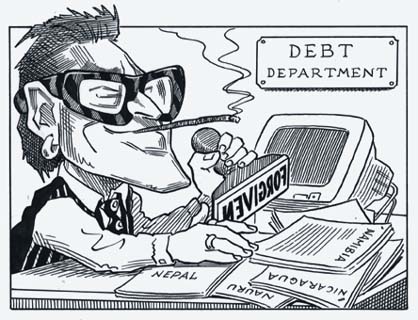- Economics
- International Affairs
- US Foreign Policy
- Law & Policy
- Civil Rights & Race
My Harvard colleague Jeff Sachs does many interesting things, but I was surprised when his secretary called to invite me to lunch with him and Bono, the lead singer of the rock group U2. Bono wanted to discuss the Jubilee 2000 campaign, which is a global movement aimed at canceling the international debts of the world’s poorest countries. My first instinct was to decline, but I decided to check things out with my daughter, Lisa, who is an expert on rock stars. She said: “Dad, this is the coolest thing imaginable. I finally appreciate the fringe benefits from having a father who is a famous economist. Of course you have to go.” Since I never miss a chance to impress one of my kids, I naturally went to lunch.
 Illustration by Taylor Jones for the Hoover Digest Illustration by Taylor Jones for the Hoover Digest |
At the lunch, I said that I was an unlikely candidate to support Jubilee 2000 and that some leftist economists would be much more promising. Bono said that was precisely why he wanted to talk with me. He wanted to see whether hard-thinking conservative economists could be convinced of the soundness of the campaign. In particular, he was not interested in another global welfare project, such as Live Aid in the 1980s, but rather wanted to push debt relief as a way to promote sound economic policies. He even said that the relief would be contingent on a country’s commitment to use the freed-up money for productive investments in a transparent economic environment.
TOP 10 LIST
I was shocked to hear these kinds of arguments from a rock star. Nevertheless, I recovered sufficiently to say that this commitment would be unenforceable and that debt relief would not be on the Top 10 list of policies for growth promotion in poor countries. More important were well-functioning legal institutions, promarket policies, education, and macroeconomic stability. I mentioned the musical line “money for nothing” (sung by Sting, accompanying Dire Straits) and said that it applied to a number of ways in which a country obtained unearned resources. These included debt relief, debt default, foreign aid, and even natural resources, such as oil. Experience showed that all these cases of free money were harmful for economic growth. I also argued that growth would be encouraged if a country gained a reputation for honoring foreign debts and other agreements.
Bono agreed that it was important for a country to fulfill its debt obligations, especially those that originated from sensible commercial transactions. But he and Sachs argued that most of the international debt of African and other poor countries stemmed from badly designed projects conceived by the World Bank, other international organizations, and donor countries such as the United States. Many of these loans had been made to corrupt dictators who diverted the funds for personal gain. They noted that these debts could never realistically be repaid and that the overhang of interest payments prevented new international financing of sound investments. Bono said that the whole idea of the term Jubilee 2000 was that it was a onetime happening and would therefore not encourage default on future debts. (I was a bit worried here, because the Bible says that jubilees are supposed to occur every fifty years.)
IMF FARCE
Sachs was instinctively more sympathetic than I to the campaign because he has never thought debt default did much damage to a country’s reputation. Although not persuaded on this point, I was impressed when Sachs argued that we should assess the debt relief not so much from the standpoint of the borrowers, who would be getting money for nothing, but rather from the perspective of the lenders. These creditors, especially the World Bank and the International Monetary Fund, would be forced to write down their Third World loans to realistic market values. This requirement might then induce the international financial institutions to make future loans on a sounder economic basis. Of course, the worst charade about debt valuation—the latest IMF loan to Russia—would not be covered by the Jubilee campaign. The IMF recently agreed to lend another $4 billion to Moscow just to finance an interest payment on the country’s outstanding debt to the IMF. This allows the IMF to pretend that the loan had not been defaulted on.
In the end, I was not persuaded to put debt relief on the Top 10 list of growth-promoting policies for poor countries. But the arguments I heard were better than I had anticipated. Therefore, I am pleased to offer two restrained cheers for Jubilee 2000!
Anyway, at the close of the meal, I swapped two of my books for something much more valuable—Bono’s autograph on four CDs, one for each of my children. So the lunch clearly succeeded in making me a hero with my kids. What’s more important than that?







